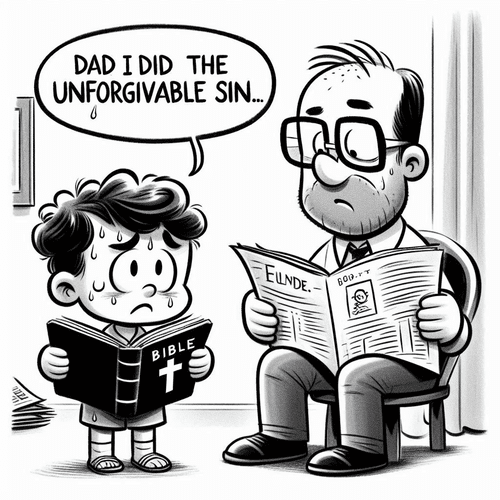The Unpardonable Sin: What is the Blasphemy Against the Spirit?
The unpardonable sin is the severe transgression Jesus warns us about in the gospels (Matthew 12:31-32; Mark 3: 28-29; and Luke 12:10—hover your cursor over the verses to read them). People refer to the sin also as the unforgivable sin, blasphemy against the Holy Spirit, the eternal sin, or even ‘the’ sin. Christians tend to hold one of four views on what this sin entails. Join us as we explore what these four perspectives are:
- Committing severe sins such as adultery, murder, or denying Christ under duress
- Asserting falsehoods about the Holy Spirit
- Attributing Spirit-empowered miracles to Satan
- Decisively rejecting clear truth revealed by the Spirit about Jesus by claiming His works are from Satan—this is the view held by most churches in the Reformed tradition.
Let’s consider each of these views by turn.
View 1: Committing Severe Sins such as Adultery, Murder, or Denying Christ Under Pressure
This view suggests extremely severe sins such as adultery, murder, or denying Christ under persecution are unforgivable. However, this view does not fit the context of Matthew 12, Mark 3, and Luke 12: and is clearly contradicted by the Bible: how can we be sure? King David committed both adultery and murder (2 Samuel 11–12; Psalm 51), Paul persecuted Christians (1 Timothy 1:13), and Peter denied Christ three times (John 18:15–18, 25–27; 21:15–19). Yet, all were forgiven. Genuine Christians continue to sin in various ways, but God forgives those who repent because of Jesus (1 John 2:1).
View 2: Asserting Falsehoods About the Spirit
Early church fathers including Cyril of Jerusalem, believed the unpardonable sin was asserting falsehoods about the Holy Spirit. However, this interpretation is too broad. Many non-Christians and Christians have held incorrect beliefs about the Spirit but later corrected them upon gaining better understanding.
View 3: Attributing Spirit-Empowered Miracles to Satan
This view, favoured by some dispensationalists, limits the unpardonable sin to attributing Jesus’ miracles to Satan. Some argue it could only be committed during Jesus’ ministry or the first century when miracles occurred. However, as DA Carson notes, miracles do not necessarily always indicate the Spirit’s presence and power (Matthew 7:21–23).
View 4: Decisively Rejecting Clear Spirit-Revealed Truth About Jesus by Attributing His Works to Satan
This perspective, held by the likes of John Calvin, suggests the unpardonable sin involves a conscious, deliberate rejection of clear spiritual truth about Jesus, particularly by attributing His miraculous works to demonic forces, rather than the Holy Spirit.
- It’s not an accidental or impulsive act, but a wilful repudiation of truth.
- Those who commit this sin resist God’s truth despite being aware of its validity.
- It involves a persistent, lifelong rejection of Jesus without repentance.
- God may respond by hardening the person’s heart, making repentance impossible.
- Only unbelievers can commit this sin.
This view distinguishes the unpardonable sin from apostasy, though there are similarities:
- Both involve resolute rejection of truth.
- Both result in a state beyond repentance.
- Scriptural passages about apostasy (Hebrews 6:4-6, 10:29; 1 John 5:16) do parallel aspects of the unpardonable sin.
Important considerations:
- It appears unlikely we may ever be able to definitively judge if someone has committed this sin while they’re alive. Only God can know for certain who has committed it.
- Those truly guilty of the sin are typically not concerned about it.
- Worry about having committed ‘the’ sin is thus often a sign one has not done so.
- Moreover, believers in Jesus can rest assured they shall not be condemned (Romans 8:1).
This view emphasises the gravity of repeatedly and knowingly rejecting clear spiritual truth about Jesus, while also offering reassurance to those who maintain faith or show concern for their spiritual state.
Conclusion
Some worry they may have committed the unpardonable sin. Those who are worried if they have, likely have not done so. How do we say so? Well, concern indicates a responsive heart. If you feel remorse for your sins and trust in Jesus, you have not committed the unpardonable sin. Instead of feeling condemned, continue to repent and trust in Jesus, for there is no condemnation for those in Him (Romans 8:1).
Related FAQs
- Can Christians commit the unpardonable sin? Most theologians assure us true believers in Christ cannot commit the unpardonable sin. If we have faith in Jesus and feel remorse for our sins, we have not committed this sin.
- How do I know if I’ve committed the unpardonable sin? If you’re worried about having committed the unpardonable sin, it’s a strong indication that you haven’t. Those who have committed this sin typically show no concern for their spiritual state.
- Is denying Christ under pressure considered the unpardonable sin? No, denying Christ under pressure is not considered the unpardonable sin. The Bible provides examples of forgiveness for such actions, like Peter’s denial of Jesus.
- Can the unpardonable sin be forgiven if someone repents? By definition, the unpardonable sin cannot be forgiven. However, if someone is able to repent and seek forgiveness, it’s a sign they have not committed this sin.
- Can we determine if someone has committed the unpardonable sin? Those who hold the fourth view suggest we cannot definitively judge if someone alive has committed this sin. Only God knows a person’s heart and ultimate spiritual state. Even after death, we can’t be certain, as a person’s final moments are known only to God.
Related Reads
Editor's Pick

Does the Bible Clearly Teach the Deity of Christ?
Critics argue Jesus never explicitly claimed to be God. Others suggest the doctrine emerged centuries later through philosophical speculation. But [...]

The Holy Spirit’s Indwelling: How Can I Be Sure I Have It?
“Am I truly saved? How can I know for certain that the Holy Spirit lives within me?” If you’ve wrestled [...]

Did Mary Remain a Virgin? A Biblical Case Against Perpetual Virginity
The question of Mary’s perpetual virginity has divided Christians for centuries. While Catholic and Orthodox traditions affirm Mary remained a [...]

Is Occam’s Razor a Compelling Argument Against Theism?
WHY THE ARGUMENT ACTUALLY POINTS TO GOD Picture this: You're in a coffee shop debate with a confident sceptic [...]

Is the Doctrine of Justification in the Old Testament?
WAS PAUL INVENTING SOMETHING NEW OR REVEALING SOMETHING ANCIENT? Picture this scene: You’re discussing faith with a thoughtful sceptic who [...]

How God Reveals Himself to Us: General and Special Revelation
Every human heart carries an undeniable longing to know ultimate truth—to understand our place in the universe and the longing [...]

Doctrine of God and Bible Interpretation: Are The Two Connected?
Picture this: Two seasoned pastors read the same verse about God's sovereignty and human responsibility. One concludes God determines all [...]

What Did Jesus Mean: ‘I Bring Not Peace But a Sword’?
Jesus’ statement may sound perplexing to us at first read: "Do not think that I have come to bring peace [...]

The Beatitudes: The Nine Marks of Those Jesus Calls Blessed
When Jesus climbed that hillside in Galilee and began to speak, He turned the world's understanding of blessing upside down. [...]

Sacred Sorrow: Why Jesus Calls Mourning a Blessing
MAKING SENSE OF THE DIVINE PARADOX IN MATTHEW 5:4 When Jesus declared, “Blessed are those who mourn, for they will [...]
SUPPORT US:
Feel the Holy Spirit's gentle nudge to partner with us?
Donate Online:
Account Name: TRUTHS TO DIE FOR FOUNDATION
Account Number: 10243565459
Bank IFSC: IDFB0043391
Bank Name: IDFC FIRST BANK






